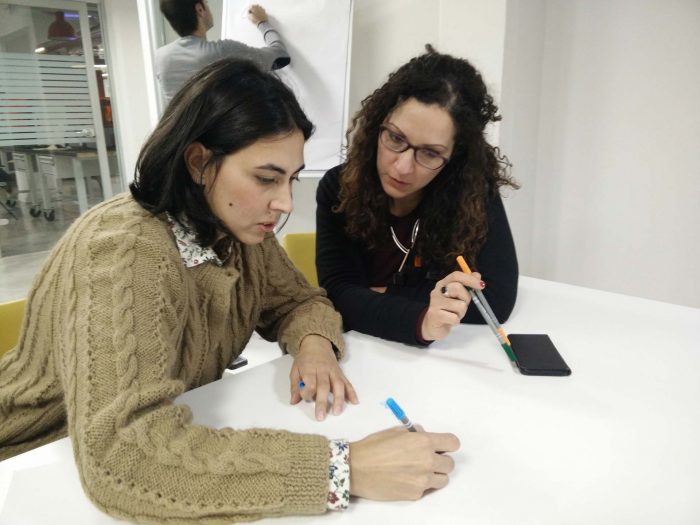In which I tell my experience as a facilitator of five workshops, during the years 2018-2019, for the Observatory on the Dialogue in the Agri-food System (OsservAgro).
Series Navigation
Collective Intelligence Design and Facilitation
Facilitating Collective Intelligence for the Sustainability of Agri-food
Only shared decisions are effective in the long-term
It’s in historical moments like this that we need to think more about creating better futures. You need to act in advance to build a network of change agents that could work collectively in creating better futures. This is the main reason why I worked passionately and with great fun with the organizers of the Osservatorio sul Dialogo nell’Agroalimentare (Observatory on the Dialogue in the Agrifood System). We leveraged on the Collective Intelligence for envisioning together better futures for the systems of food and agriculture.

I was the lead Collective Intelligence Facilitator for five participatory workshops held by the Observatory. I had a great learning experience with them. I met smart and wise people: scientists, researchers, teachers, communicators, managers, opinion leaders, event organizers, activists, common people, and facilitators. We investigated the stakeholders, we mapped the systems of their relationships and we ideated a better future for our Society by identifying a Vision, a Mission, and practical objectives to take action upon.
What is OsservAgro?
The Observatory on the Dialogue in the Agrifood System Observatory (Osservatorio sul Discorso nell’Agroalimentare) has been founded in early 2018 by:
- FIDAF (Federazione italiana dottori in agraria e forestali),
- Associazione Passinsieme
- the Festival Cerealia network
- and by a group of researchers, teachers, and actors having an interest in the dynamics of the agri-food sector.
The key persons I worked with made a difference in how the movement has been organized and the opportunities they’ve created during the co-design sessions. I am thinking, in particular, to Andrea Sonnino, the Observatory’s Coordinator and Paola Carrabba, a tireless science researcher who worked hard to support all the activities of the Observatory. I’ve been lucky and honored to be introduced to them by my friend Marco Valente, a professional facilitator, initially involved with them.
The problem: Agri-Food is Unsustainable
We went through a path of collective reflection where diverse people from different backgrounds were convened together. Marco Valente facilitated the first of the six public encounters while I was responsible to organize and facilitate the remaining events.
We discovered that there is a lack of dialogue between all parts of society: Science, Politics, Business, Media, Education, and Citizens. The linear model for knowledge transfer of the past doesn’t work anymore. In the last century, unified knowledge was generated by scholars, recognized as the official creators of such knowledge, and then it was transferred by professionals, teachers, specialists and journalists to the masses which benefited passively.
Today, knowledge, pulverized in hyperspecialization, is communicated through fragmented narratives and languages to the large public, which on the one hand asks for more active participation in the decision-making processes which involve themselves, on the other hand, are frequently disoriented by a confused flow of contradicting information. The roles of diverse stakeholders acting as economic operators, decision-makers, influencers, and knowledge builders, became liquid, adapting to the different contexts where they act.
This has led to confusing communication, mono-directional information flows, fragmentation of languages. This novel situation generates a climate of confusion and uncertainty, reciprocal distrust, a lack of respect for competences and roles and a difficult resolution of diverging interests. This issue is particularly evident in food and agriculture, in which interactions with consumers’ health and with the environment are concerning the whole Society.
As a consequence, it becomes harder to make decisions: because they are not shared, because there are reciprocal distrust and a poorer recognition of the reciprocal role of everybody.
Our approach: Facilitated Collective Intelligence
We adopted and applied participatory methods of Collective Intelligence strongly based on Critical Thinking and Systems Thinking approaches. The agri-food system has peculiar features, but also universal elements, that is why reflecting on this system could offer important insights also for other scopes.

In our workshops, we re-established an environment of reciprocal trust where, together, we could imagine possible futures and how to reach them. Now, we want to extend to the entire society our experience to make decisions that last longer. Only shared decisions are more effective in the long-term and we want to create a network of Change Agents to build novel sustainable futures.
The outcome: Mission, Manifesto, and Actions
This is the first of an article series in which I begin to write about my experience of facilitating several co-creation workshops. In the next articles, I will tell you how we’ve contributed to writing and rewriting the Observatory’s Mission and how we laid the foundations for a Manifesto to be published. I will write more about the method and how we have defined a set of actions for specific groups of actors to activate a Network of Change Makers for the Sustainability of the Agri-Food Systems.
While you can join the OsservAgro (if you can read Italian) to tell your story of food and territory and be part of a more Sustainable Society, keep on following me on Curatella.com to learn more about my facilitation experience with this project.
Thanks to Andrea Sonnino, and Paola Carrabba for the help in writing this article.
Series Navigation
Collective Intelligence Design and Facilitation
Facilitating Collective Intelligence for the Sustainability of Agri-food


One response to “Facilitating Collective Intelligence for the Sustainability of Agri-food”
[…] how do you grow a following if you write about Systemic Design one day, Systems Change, the other, Facilitation of the Collective Intelligence the third, and self-development through writing, the […]